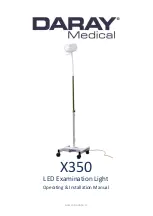
- 10 -
- 11 -
n
Disconnect the power supply before attempt-
ing any work on the light.
n
During installation, the electrical wiring you
are connecting must be dead. Therefore,
switch off the power first and use a voltage
tester to make sure the wiring is off circuit.
n
Installing the SensorLight involves work on
the mains voltage supply. This work must
therefore be carried out professionally in ac-
cordance with national wiring regulations and
electrical operating conditions
(
D
-VDE 0100,
A
-ÖVE / ÖNORM E8001-1,
-SEV 1000).
Principle
a
The integrated infrared sensor is equipped with
two 120° pyro sensors which detect the invisi-
ble heat emitted by moving objects (people,
animals etc.).
The heat detected is converted electronically
into a signal that switches the light ON auto-
matically. Heat is not detected through obsta-
cles, such. as walls or panes of glass. Heat ra-
diation of this type will, therefore, not trigger
the sensor. The two pyro sensors have an angle
of coverage of 240° with an angle of aperture of
180°.
Important:
The most reliable way of detecting
movement is to install the SensorLight with the
sensor aimed across the direction in which a
person would walk and by ensuring that no ob-
stacles (such as trees, walls etc.) obstruct the
line of sensor vision.
Installation Instructions
GB
Dear Customer,
Safety precautions
Congratulations on purchasing your new
STEINEL SensorLight and thank you for the
confidence you have shown in us.
You have chosen a high-quality product that
has been manufactured, tested and packed
with the greatest care.
Please familiarise yourself with these instruc-
tions before attempting to install the Sensor-
Light because prolonged, reliable and trouble-
free operation will only be ensured if it is fitted
and used properly.
We hope your new STEINEL SensorLight will
bring you lasting pleasure.
Operation/Maintenance
The SensorLight is suitable for switching light
ON automatically. Weather conditions may af-
fect the way the SensorLight functions. Strong
gusts of wind, snow, rain or hail may cause the
light to come ON when it is not wanted because
the sensor is unable to distinguish sudden
changes of temperature from sources of heat.
The detector lens may be cleaned with a damp
cloth if it gets dirty (do not use cleaning agents).
Installation/Wall mounting
b
The site of installation should be at least 50 cm
away from another light because heat radiated
from it may activate the system. To achieve the
specified max. reach of 12 m, the light should
be installed at a height of approx. 2 m.
Undo the screw on the top panel. Remove
screw and pull out wall mount.
Do not detach internal wiring from terminal
block, but gently pull out entire terminal
assembly.
Hold the mounting plate against the wall and
mark where to drill the holes, paying attention
to any wiring already existing in the wall, drill
holes; insert wall plugs. For the motion detector
to trigger a switching operation, the mains
power must be fed to the load by at least a
two-core cable. To do this, pierce the mounting
plate and fit sealing plug.
The mounting plate can be aligned and screwed
in place after feeding the cables through.
Connecting the mains power supply lead
The mains power supply lead is a 2 to 3-core
cable.
L
= phase conductor
(usually black, brown or grey)
N
= neutral conductor
(usually blue)
PE
= any protective earth conductor
(green/yellow)
If you are in any doubt, identify the conductors
using a voltage tester; then disconnect from the
power supply again.
Connect phase conductor
(L)
and neutral con-
ductor
(N)
to the terminals to which a cable of
the same colour is already connected. Wrap in-
sulation tape around the end of the protective
earth conductor
(PE)
.
Important:
Getting the cable connections
crossed will produce a short circuit in the light
or in your fuse box. In this case, you must
check the identification of all cables and re-
connect them.
A mains switch for switching the light ON and
OFF can of course be installed in the mains
lead.
Declaration of Conformity
This product complies with
- Low-Voltage Directive 2006/95/EC
- EMC Directive 2004/108/EC
- RoHS Directive 2011/65/EC
- WEEE Directive 2012/19/EC
BLACK / BROWN / GREY
BLUE
L
N
GB























